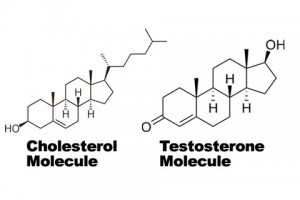It has long been taught in health orthodoxy that a low-fat diet was ideal for preventing disease; but more and more, this idea is being called into question. As more and more new research comes in, the orthodox medical establishment has had to grudgingly admit that perhaps their theories have been wrong all along. On the weight maintenance side of things, we have been taught that higher intake of dietary fat makes us gain body fat, but research is now showing that the opposite may be the case.
One must keep in mind that fat is a basic building block of the body. For instance, the membranes of every cell in the body are overwhelmingly composed of fat molecules. Optimal health of the cells requires adequate intake of fats for the production and maintenance of the cell membranes. Furthermore, those fat molecules must be of the correct type to create cell membranes of greatest health. Eating artificially altered fats such as hydrogenated oils will impact the quality of cell membranes as unnatural molecules become incorporated into the structure of cell membranes. Dietary fat is not just fuel!
 Fat and cholesterol are also essential building blocks of hormones such as estrogen and testosterone. A diet too low in fat could well result in levels of hormones too low for health. How handy it is that those who have followed the medical industry’s guideline of a low fat diet now find themselves dealing with deranged hormone levels. Now the pharmaceutical industry can sell them hormone patches to bring those hormone levels back up. They must be seeing dollar signs! Wouldn’t it be better, though, to correct the problem at its source? That would be done by correcting the dietary imbalance that created the problem in the first place. Disease is the result of either insufficient nutrition and/or exposure to toxins. When the environment of the cells is corrected, health returns. The correction required to improve levels of hormones such as testosterone and estrogen is the inclusion in the diet of more fat including saturated fat. Testosterone and other steroidal hormones are actually derived from cholesterol, and so cholesterol must be present for the creation of these hormones. If the level of these hormones in your body is too low, then perhaps it is because you are doing too good of a job of “controlling” your lipids and cholesterol. Good sources of dietary fat include the following:
Fat and cholesterol are also essential building blocks of hormones such as estrogen and testosterone. A diet too low in fat could well result in levels of hormones too low for health. How handy it is that those who have followed the medical industry’s guideline of a low fat diet now find themselves dealing with deranged hormone levels. Now the pharmaceutical industry can sell them hormone patches to bring those hormone levels back up. They must be seeing dollar signs! Wouldn’t it be better, though, to correct the problem at its source? That would be done by correcting the dietary imbalance that created the problem in the first place. Disease is the result of either insufficient nutrition and/or exposure to toxins. When the environment of the cells is corrected, health returns. The correction required to improve levels of hormones such as testosterone and estrogen is the inclusion in the diet of more fat including saturated fat. Testosterone and other steroidal hormones are actually derived from cholesterol, and so cholesterol must be present for the creation of these hormones. If the level of these hormones in your body is too low, then perhaps it is because you are doing too good of a job of “controlling” your lipids and cholesterol. Good sources of dietary fat include the following:
- Olives and Olive oil
- Coconuts and coconut oil
- Butter made from raw grass-fed organic milk
- Raw nuts, such as, almonds or pecans
- Organic pastured egg yolks
- Avocados
- Grass-fed meats
- Palm oil
- Unheated organic nut oils
Current high rates of vitamin D deficiency in the United States may also be due to the low-fat diet orthodoxy. Vitamin D is made from cholesterol and resembles a steroidal hormone.
Too much sugar intake can also reduce testosterone levels. Carbonated beverages have become the greatest contributor to sugar intake. If one needs to break the habit of drinking sugary beverages, I suggest making diet sodas with carbonated water and natural alternative sweeteners such as stevia. Liquid stevia extract is available already flavored. Plain liquid stevia can also be used with separate flavors or lemon juice. Suppliers of natural flavor products can be found online. Xylitol is also a good choice since it helps control harmful microbes in the body that can result from eating a diet too high in carbohydrates. Artificial sweeteners such as aspartame (Nutrasweet) and sucralose (Splenda) should be strictly avoided due to their high toxicity.
What all of this comes down to is that a low-carb high-fat Atkins-like diet may be useful in correcting hormone derangement. This diet reduces carbs and raises fat while keeping protein levels steady. When protein levels are kept steady, stress on the kidneys is prevented, thus eliminating the primary medical concern about low-carb diets. Carbohydrates in such a diet should come from vegetables.
Further reading:
9 Body Hacks to Naturally Increase Testosterone
Low Testosterone and Heart Disease Linked—But What’s Really Causing Them?
Testosterone Decline: How to Address This Challenge to ‘Manhood’
Rising Role Of Fat Reveals Importance In Strength And Performance!
Diet and serum sex hormones in healthy men.
Low-Fat Diet and Avoidance of Vitamin D – Two Health Recommendations You’re Best Off Rejecting
The link between vitamin D deficiency & low-fat diets
The Potential Dangers of Sucralose (Splenda)
Aspartame: By Far the Most Dangerous Substance Added to Most Foods Today
What is a high-fat diet
The Art and Science of Low Carbohydrate Living: An Expert Guide to Making the Life-Saving Benefits of Carbohydrate Restriction Sustainable and Enjoyable